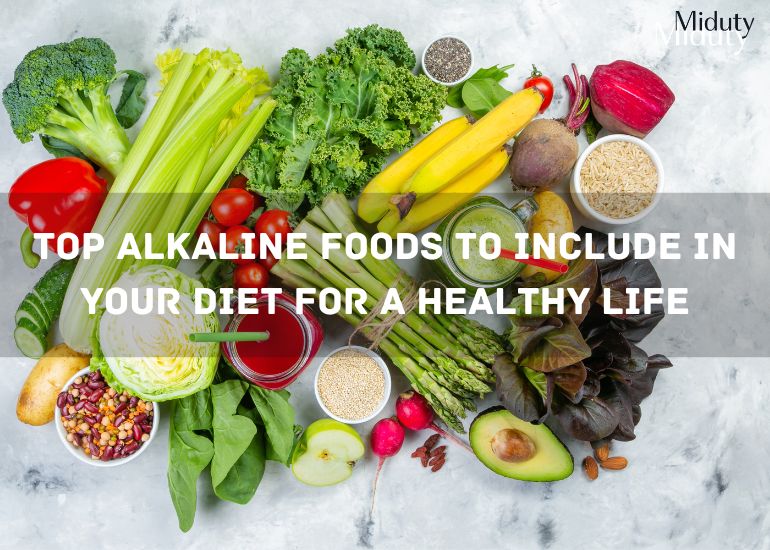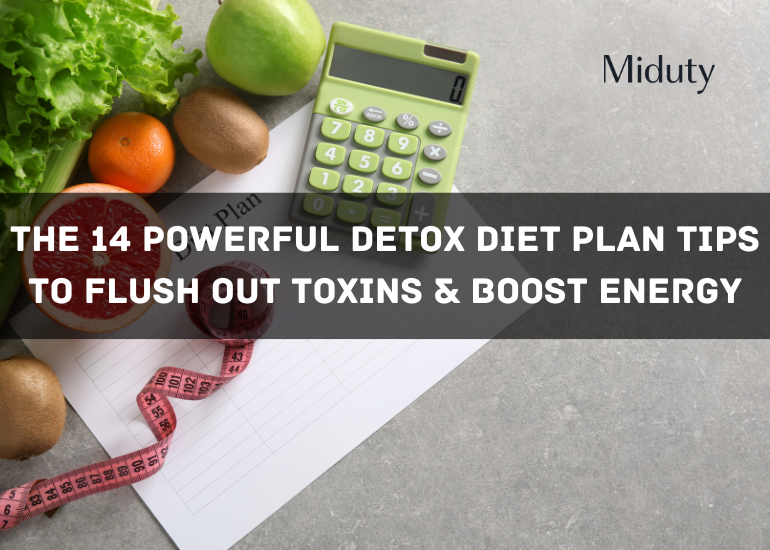
Top Alkaline Foods to Include in your Diet for a Healthy Life
What is Body pH and its Importance? | Reasons for Acidic Body | Benefits of Alkaline Body | Top Alkaline Foods | Risk of Excessive Alkaline | Symptoms of Excessive Alkaline | Conclusion

Alkaline vs. Acidic – what's all the buzz about? You've probably seen signs at health stores or heard people talk about "alkaline diets" and "acidic foods," but what does it all mean?
The idea is simple: our body’s pH balance plays a crucial role in how we feel and function. With the growing trend of alkaline diets, many are curious about how to shift their body towards a more alkaline state. In this article, we’ll dive into the importance of pH levels, why being more alkaline is beneficial, and how you can make small dietary changes to help your body thrive..
What is Body pH and its Importance?
Different parts of our bodies have different pH levels. Your overall pH level indicates whether your body's tissues and fluids are more acidic, alkaline or neutral. Our stomachs are more acidic because they need to break down food using hydrochloric acid (stomach acid). Our blood pH level should ideally be at 7.4. This would put it on the alkaline side of the pH scale. A pH of 6.5 up to 7.5 is okay.
7.4 is the best pH level to be at for health. The pH scale goes from 0-14, 0-6.9 is acidic, 7 is neutral, and 7.1-14 is alkaline. The problem with our blood being acidic is that it's used to transport various nutrients, hormones, oxygen and carbon dioxide, etc, all around our bodies. It has access to every cell. So if our blood is acidic, then our bodies are more acidic.
Right Ph is so important to transport minerals, allowing enzymes to work and even for the thyroid health.
The body is pretty good at making sure that it's pH levels are at the optimal level. Your body will always try to keep itself in the state it functions best in (homeostasis), that includes things like your pH, your body temperature, and trying to remain hydrated. But sometimes things go wrong and our pH can rise for various reasons. Acidosis is the medical and scientific term used for when your body is acidic, especially to the point of being unhealthy and causing problems.
Usually, it's illnesses that cause this, such as diabetics who may struggle to maintain their blood sugar levels or someone with respiratory problems where the lungs aren't able to keep the right balance between oxygen and carbon dioxide. It's not always existing illnesses that can cause a problem, however. Our lifestyle choices and environments can also be to blame too.
Also Read: Acidity Bothering You? Try These Home Remedies for Instant Relief
Reasons for Acidic Environments in the Body
- Poor dietary choices
- Over-exercising
- Stress
- Nutritional deficiencies
- Alcoholism
- Being overweight or obese
- Exposure to chemicals and pollution
What are the Benefits of an Alkaline Body?
When your body is at the ideal pH level, there is less chance of inflammation which reduces your risk of illnesses and you'll notice a few other benefits along the way. Your body is able to function better since this is what the body needs. The benefits include:
- Healthier skin
- Easier to maintain and reach a healthy weight
- Prevents cancer, diabetes and heart disease
- You'll get sick a lot less often
- Healthier bones and joints
- More energy
- Increased ability to cope with stress in a healthy way
- Better digestion
An alkaline diet, or eating mostly alkaline foods can help our bodies to become more alkaline and less acidic. These foods are often very nutrient dense and help to support your health in many ways other than just making sure that your body is more alkaline. Your body will function better overall. Limiting or avoiding acidic foods is also very helpful.
Often unhealthy habits like drinking excess alcohol, eating too much meat and eating sugary junk foods can make our bodies acidic too, so breaking these habits is a must for good health. Even something good for you, like exercise, when done in excess can cause, among other things, for your body to become acidic.
What are the Top Alkaline Foods You Should Consume?
These foods are easy to add to meals and the vegetables can be used to make delicious smoothies and juices that will benefit your health. Green juices are particularly good for promoting an alkaline pH in the body. Read more here about juicing for health.
Alkaline Promoting Foods:
- Celery
- Mushrooms
- Bell peppers
- Cucumber
- Spinach
- Kale
- Tomatoes
- Lemon
- Lime
- Broccoli
- Cauliflower
- Avocado
- Beetroot
- Almonds
- Brazil nuts
- Carrots
- Spirulina and other sea plants
- Raw apple cider vinegar
- Distilled and alkaline water
Often keeping vegetables raw maintains the nutrients. Just be sure to always cook cruciferous vegetables like broccoli, cabbage, cauliflower and brussels sprouts since they can interfere with your thyroid function when eaten raw. And to reap the maximum benefit, cook your spinach, kale, chard, tomatoes, and carrots. You can lightly steam them or quickly boil them.
When you eat nuts, choose to eat them raw, but soak them beforehand to make sure that the nutrients are made available for your body to absorb and don't interfere with the absorption from the other foods that you are eating. You may have been surprised to see some of the more acidic foods on the list. Not everything that is acidic, like the tomatoes, lemons, limes and apple cider vinegar, cause your body to become acidic.
It has to do with the way that they are digested. The body digests these foods and gets rid the acid and causing them to actually become alkaline and in doing that, to promote alkalinity in your body. Always choose organic foods where possible. The quality of the soil and the food being free of pesticides is important too.
Are There Any Risks If the Body Becomes Too Alkaline?
Though it's very rare, just like a person can develop acidosis, a person can develop alkalosis (where the body is too alkaline). This is generally caused by illnesses too where either the lungs are properly keeping the balance between oxygen and carbon dioxide, the kidneys not regulating the bicarbonate or potassium level in the body properly or when there has been a loss of certain electrolytes in the body.
All these are usually the result of someone being sick, like when they have been vomiting for a long time, sweat too much from fever and not drinking enough fluids or to replace what's lost, or have taken too much aspirin when attempting to heal themselves. Other issues can be when people urinate too much, for example, the incorrect use or overuse of diuretics. It's incredibly rare for alkalosis not be reversed and a balance brought back to the body easily enough.
Eating more acidic foods, or being medically treated where the missing electrolytes can lower the pH level and get your body back to around 7.4. Being too alkaline causes problems just as being too acidic does. It just isn't an environment that ensures the body works as well as it should.
Symptoms Of Excessive Alkaline Body
- Fatigue
- Sluggishness
- Allergies
- Wheezing
- Diarrhoea
- Muscle cramps or spasms
- Tingling or numbness in the face, arms, or legs
Conclusion
- It's important to have a body pH level of between 6.5 and 7.5 with 7.4 being the most ideal.
- Acidosis (overly acidic pH) can be due to certain illnesses, poor diet, stress, too many acidic foods and too much exercise.
- Symptoms of acidosis are joint and muscle pain, feeling out of breath, getting sick often and ulcers.
- Acid promoting foods include meat, alcohol, grains, sugar, and caffeine.
- Alkaline foods include most vegetables, mushrooms, sea plants and apple cider vinegar.
- To maintain the correct pH levels, ensure that your diet is mainly alkaline and that you don't over exercise, drink excessively and maintaining a healthy weight.
- Alkalosis (overly alkaline pH) is also not good for your body
- Alkalosis is usually caused from being sick (excessive vomiting, respiratory illnesses, kidney problems) and is rarer.
- The most common and easiest ways to test your pH levels is the urine test and the saliva test.








